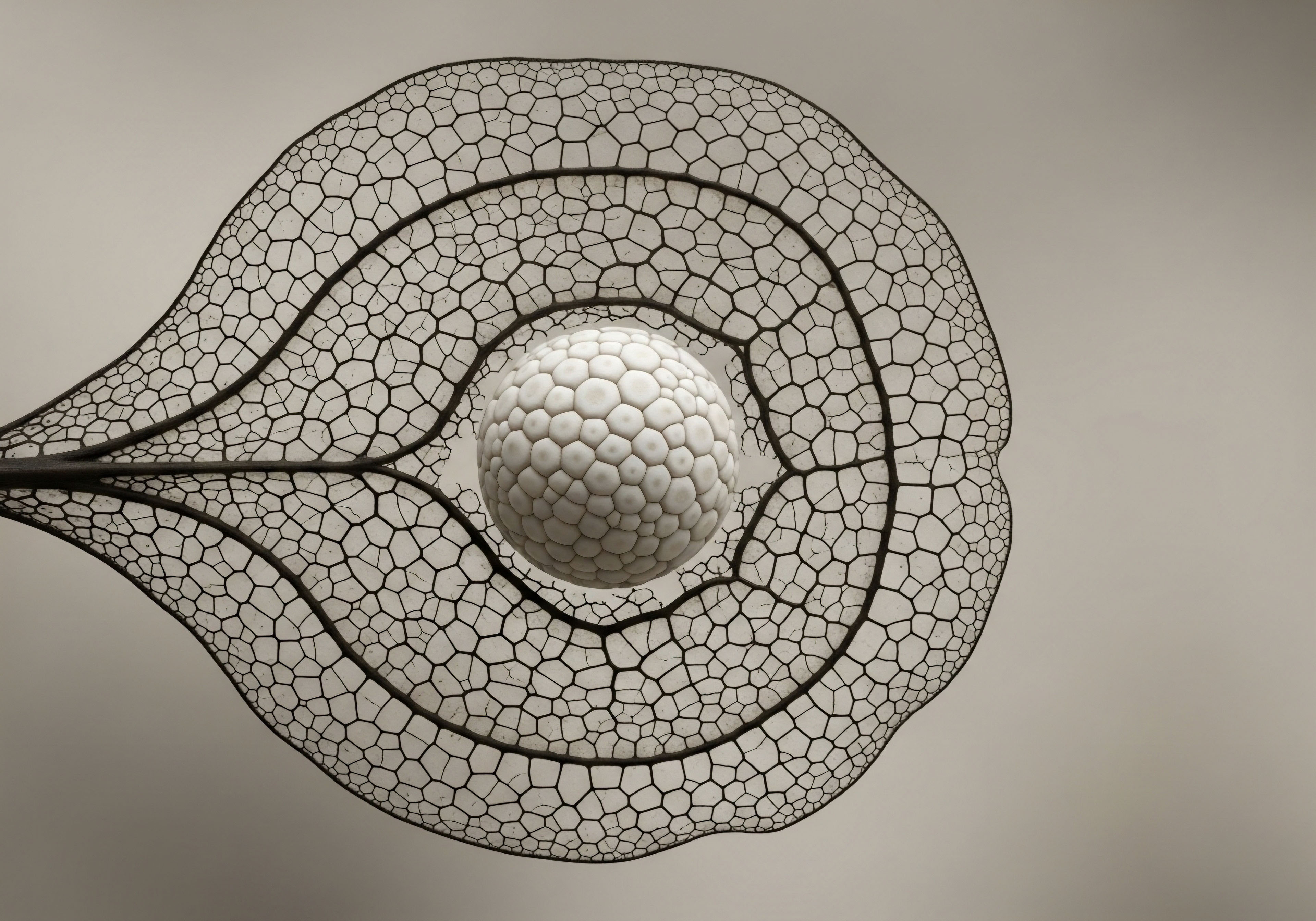

Your Prime Is a Design Problem
The narrative of aging is due for a system-wide update. A gradual decline in physical and cognitive horsepower is a reversible process. Your drive, your metabolic efficiency, and your mental acuity are direct outputs of your cellular architecture. The perceived limits of your vitality are dictated by microscopic processes that have, until now, operated without your direct input.
These processes include the accumulation of senescent cells, which are dysfunctional units that create inflammatory noise within tissues, and the progressive decay of mitochondrial function, the very power plants of your cells.
Viewing the body as a high-performance system reveals that signals like fatigue, mental fog, or a changing physique are data points. They indicate specific systems requiring a targeted adjustment. The loss of drive is not an abstract emotional state; it is a physiological event with roots in cellular energy production and hormonal signaling.
The chemical messengers that govern ambition and resilience are synthesized from foundational biological inputs. Your capacity for effort is intrinsically linked to the health of these cellular communication pathways.
Time-dependent accumulation of cellular damage, including DNA lesions and misfolded proteins, impairs organellar and cellular function, which in turn limits regenerative potential and triggers low-grade inflammation.
Therefore, the architecture of your ambition begins at the cellular level. By addressing the core mechanisms of biological decline ∞ telomere shortening, stem cell exhaustion, and altered intercellular communication ∞ you shift from a passive acceptance of aging to the active design of your own longevity. The question of vitality becomes an engineering challenge.
The raw materials and instructions that dictate your performance can be upgraded. You possess the capacity to intervene in the biological processes that define your energy and output, architecting a more resilient and high-performing internal state. This is about building a biological foundation capable of sustaining peak performance indefinitely.


The Cellular Recalibration Protocol
Recalibrating your biological infrastructure involves supplying your body with precise molecular instructions. Think of your cellular environment as a construction site. Peptides and optimized hormones function as the master architects and project managers, delivering new blueprints and upgraded materials to the cellular workforce.
This process is systematic, targeting the foundational machinery of your biology to elicit profound changes in function and performance. The intervention is not about masking signals; it is about rewriting the code that generates them in the first place.

Phase One Understanding the Cellular Power Grid
The starting point is an audit of your cellular energy systems. Your mitochondria, the powerhouses within every cell, dictate your capacity for everything from muscle contraction to cognitive processing. Age and environmental stressors degrade their efficiency, leading to a system-wide energy deficit.
Protocols centered on mitochondrial biogenesis and mitophagy ∞ the clearing of damaged mitochondria ∞ are fundamental. This is the equivalent of upgrading the power grid for an entire city. Increased energy production at the cellular level translates directly to greater physical stamina and mental clarity.

Phase Two Issuing New Directives with Peptide Therapies
Peptide therapies are the specialists of cellular architecture. These short chains of amino acids are signaling molecules, each designed to perform a highly specific task. They can instruct cells to accelerate repair, modulate inflammation, or increase the production of essential proteins like collagen. This is precision engineering, delivering a targeted message to a specific cellular receptor to initiate a desired biological cascade. The body’s own signaling pathways are used to direct cellular activity towards regeneration and optimization.
- GHK-Cu (Copper Peptide) This peptide is a foundational tool for tissue remodeling. Its primary function is to deliver copper to cells, an element vital for processes like collagen and elastin synthesis. This directly supports skin regeneration and wound healing, rebuilding the structural integrity of tissues.
- CJC-1295 & Ipamorelin This combination works on the pituitary gland to support the body’s natural production of growth hormone. This has systemic effects, influencing metabolism, supporting lean muscle mass, and improving recovery by enhancing cellular repair processes during sleep.
- BPC-157 Known for its systemic repair capabilities, this peptide is derived from a protein found in the stomach. It accelerates the healing of various tissues, including muscle, tendon, and ligament, by promoting blood vessel growth and modulating inflammation.

Phase Three Recalibrating the Endocrine Control System
Hormones are the master controllers of your biology, setting the operational tempo for everything from mood and motivation to metabolic rate. Hormone optimization protocols work to re-establish the precise balance of these chemical messengers, ensuring the signals being sent throughout your body support a state of high performance.
This involves a comprehensive analysis of your endocrine system to understand its current output and feedback loops. Subsequent recalibration uses bioidentical hormones to tune the system, correcting for age-related declines in production.
Increases in testosterone can enhance dopamine activity, impacting mood and motivation levels, while imbalances in thyroid hormones can impact cellular metabolism.
Testosterone, for instance, is a critical driver of the dopamine pathways that make effort feel good. Restoring its optimal levels directly impacts your will to engage in challenging tasks. The objective is to create an internal environment where the chemistry of ambition is abundant.
The use of transdermal applications of hormones can offer a different gene expression profile compared to oral routes, demonstrating the level of precision available in modern protocols. This is about restoring the hormonal signature of your prime, providing your cells with the same powerful directives they operated under during your peak years.


Activating the Blueprint
The decision to architect your drive is made the moment you choose to view your biology as a system you can actively manage. This proactive stance is typically adopted when the initial signals of performance decline become persistent.
A slight decrease in recovery time, a subtle dip in motivation, or the first realization that your physical output is no longer matching your ambition are all data points signaling an opportunity for intervention. It begins when you decide that your baseline can be elevated.

The Initial Shift within Weeks
The first tangible results of a cellular recalibration protocol often manifest in the quality of your recovery and sleep. With protocols designed to support growth hormone output, sleep becomes deeper and more restorative. You will notice a distinct improvement in your ability to bounce back from intense physical or mental exertion.
This is the first indication that your cellular repair machinery is operating at a higher capacity. Concurrently, you may experience a sharpening of cognitive function and a more stable mood as hormonal signaling begins to normalize.

The Performance Upgrade Three to Six Months
Within the first few months, the benefits compound into noticeable performance gains. Strength and endurance improve as mitochondrial function is enhanced and muscle tissue repair accelerates. Your body composition may begin to change, reflecting an improved metabolic state. The internal feeling is one of heightened readiness and capacity.
This is the phase where the link between cellular health and daily drive becomes undeniable. The experience of “effort feeling good,” as described in neuroscience research on testosterone and dopamine, becomes a consistent reality.

The Long-Term Architecture One Year and Beyond
Long-term, the focus shifts from acute improvement to sustained high performance and strategic longevity. A year into a consistent protocol, the biological markers of aging can show measurable improvement. This is about building a buffer against age-related decline, preparing your body today for the physical and cognitive demands of your “marginal decade,” as Dr.
Peter Attia terms it. You are not just optimizing for the present; you are engineering a future where your physical and mental capabilities remain robust. The process becomes a continuous cycle of monitoring, tuning, and upgrading your biological architecture to maintain a state of exceptional vitality.

Your Biology Is Now Editable
The tools to deconstruct and rebuild your own performance architecture are available. The science of longevity and vitality has moved from the theoretical to the practical, placing the controls of your cellular machinery within reach.
This knowledge reframes your entire relationship with your body, transforming it from a vessel subject to the currents of time into a high-performance system that responds to intelligent input. The ultimate expression of personal agency is the deliberate and skillful management of your own biology. As the physician-scientist Dr.
Peter Attia has noted, the goal is not just to add years to your life, but to add life to your years. Your drive is a reflection of your cellular health, and your cellular health is now a matter of design.

Glossary

ghk-cu

cjc-1295




